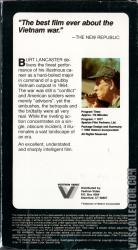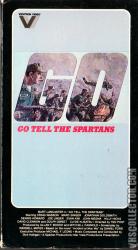Go Tell the Spartans
Catalog Number
VA 5000
-
Primary Distributor (If not listed, select "OTHER")
Catalog Number
VA 5000
Primary Distributor (If not listed, select "OTHER")
Release Year
Country
114 mins (NTSC)
N/A | N/A | N/A
N/A | N/A
Go Tell the Spartans (1978)
Additional Information
Additional Information
Moving from the home front - and tentative or oblique treatments of Vietnam - towards confrontation with the action, American cinema was gradually extricating itself from a position of silent complicity and stuttering out the sort of moralistic mush that permeates Go Tell the Spartans, one of the first 'platoon movies' of Vietnam. Post's film is fundamentally that old post-World War II standby, the anti-war-movie, a second generation offspring of the conscience-stricken cavalry movie. It's brought up to date to the extent that our human/wise/ rebellious hero (Lancaster - count his speeches) can die with a final exclamation of 'Oh, shit!' - an apt summation of a film that parades characters and quotes expressly included to be dismissed with a self-satisfied cynical shrug. Message-mongering for morons.
In January 1964, American troops in Vietnam were euphemistically termed "military advisors." As the film begins, Major Asa Barker (Burt Lancaster) has been given command of a poorly-manned outpost named Muc Wa in rural South Vietnam. This outpost, located somewhere near the rural Da Nang to Phnom Penh (Cambodia) highway, had been the scene of a massacre of French soldiers during the First Indochina War a decade earlier. Barker is a capable commander, but also a weary infantry veteran in his third war (he served in the Pacific during World War II as well as in the Korean War) whose career has been badly damaged by a previous affair with a senior officer's wife. In his new role, he is expected to provide veteran supervision to a cadre of advisors attached to a group of South Vietnamese soldiers who garrison the deserted village.[2]
As a seasoned officer, Barker knows that he cannot defend his position due to lack of numbers and the poor quality of his local troops. Nevertheless, he is still obliged to carry out the orders of his superior, General Harnitz (Dolph Sweet), who sends Barker U.S. re-enforcements to appease him. His command now consists of a handful of U.S. soldiers (encompassing the inexperienced, unhappy, idealistic and glory-seeking) and some reluctant former Vietnamese paddy farmers turned militiamen. Barker argues that the hamlet is deserted and has no importance, but sends a detachment from his command to occupy it. The detachment is commanded by the brash but nervous Lt. Hamilton, and includes veteran sergeant Oleonowski, who is suffering from battle fatigue; a drug-addicted medic, Cpl. Lincoln; and a young draftee, Cpl. Courcey, who quickly befriends an elderly native volunteer, nicknamed "Old Man".
On their way to Muc Wa along a dirt road, the column is ambushed at a roadblock, resulting in ARVN Cpl. Cowboy capturing and beheading the lone Viet Cong attacker. On reaching the hamlet, Hamilton sets up his defenses in a triangular formation and receives supplies brought in by helicopter. At the rear of the hamlet is a graveyard of 302 French soldiers with a placard above the entrance that reads, in French, "Étrangers, dites aux Spartiates que nous demeurons ici par obéissance à leurs lois (Stranger, tell the Spartans that we remain here in obedience to their orders)", which refers to the ancient Battle of Thermopylae. While he is investigating the cemetery, Courcey spots a one-eyed VC soldier, who is presumably a scout. Back at Barker's base, Barker receives a Psy-ops officer who claims that he can predict which one of Barker's outposts the VC will attack next.
During the following night Muc Wa is attacked by the VC, sustaining its first casualties when Lt. Hamilton is killed along with a few South Vietnamese soldiers. The next day, Sgt Oleonowski commits suicide rather than face the pressure of command. When Barker is informed of the deaths, he wants to pull his troops out now that they lack an experienced leader, but this request is refused by Harnitz, forcing Barker to send his own deputy to Muc Wa. When the psy-ops man predicts Muc Wa will be attacked, Barker contacts them by radio only to learn that they're under attack from the Viet Cong.
On the second night, and true to Barker's predictions, the outpost is attacked again and this time overwhelmed by the massive numbers of Viet Cong who number in the many thousands, not the few hundred predicted by the high command, all of whom are well armed with various automatic weapons rather than outdated rifles. Barker is order by Harnitz to withdraw the American troops, leaving behind the South Vietnamese—including the walking wounded. The idealistic Courcey refuses to leave the wounded, so Barker stays behind with him to help evacuate the remaining South Vietnamese troops and militiamen. This leaves Barker, Courcey, the Old Man and his fellow South Vietnamese militiamen at Muc Wa, and in the ensuing battle almost everyone is killed, including Barker who had stayed behind to cover their escape.
The only American survivor is ironically the willing volunteer, Courcey, whose idealism and enthusiasm for the Vietnam War has now been killed together with his comrades. He wakes up after the battle in the morning to find that everyone else is dead and the soldiers, including Barker, have been stripped of their fatigues. The VC have withdrawn, having left him for dead. As Courcey wanders to the grave site, he finds another survivor: the wounded, one-eyed VC scout that he saw earlier. The VC points his rifle at Courcey before dropping it out of exhaustion. Courcey says to the one-eyed VC, "I'm going home, Charlie, if they'll let me" as he wanders off the grave site and onto the dirt road leading away from the ruins of the village.
In January 1964, American troops in Vietnam were euphemistically termed "military advisors." As the film begins, Major Asa Barker (Burt Lancaster) has been given command of a poorly-manned outpost named Muc Wa in rural South Vietnam. This outpost, located somewhere near the rural Da Nang to Phnom Penh (Cambodia) highway, had been the scene of a massacre of French soldiers during the First Indochina War a decade earlier. Barker is a capable commander, but also a weary infantry veteran in his third war (he served in the Pacific during World War II as well as in the Korean War) whose career has been badly damaged by a previous affair with a senior officer's wife. In his new role, he is expected to provide veteran supervision to a cadre of advisors attached to a group of South Vietnamese soldiers who garrison the deserted village.[2]
As a seasoned officer, Barker knows that he cannot defend his position due to lack of numbers and the poor quality of his local troops. Nevertheless, he is still obliged to carry out the orders of his superior, General Harnitz (Dolph Sweet), who sends Barker U.S. re-enforcements to appease him. His command now consists of a handful of U.S. soldiers (encompassing the inexperienced, unhappy, idealistic and glory-seeking) and some reluctant former Vietnamese paddy farmers turned militiamen. Barker argues that the hamlet is deserted and has no importance, but sends a detachment from his command to occupy it. The detachment is commanded by the brash but nervous Lt. Hamilton, and includes veteran sergeant Oleonowski, who is suffering from battle fatigue; a drug-addicted medic, Cpl. Lincoln; and a young draftee, Cpl. Courcey, who quickly befriends an elderly native volunteer, nicknamed "Old Man".
On their way to Muc Wa along a dirt road, the column is ambushed at a roadblock, resulting in ARVN Cpl. Cowboy capturing and beheading the lone Viet Cong attacker. On reaching the hamlet, Hamilton sets up his defenses in a triangular formation and receives supplies brought in by helicopter. At the rear of the hamlet is a graveyard of 302 French soldiers with a placard above the entrance that reads, in French, "Étrangers, dites aux Spartiates que nous demeurons ici par obéissance à leurs lois (Stranger, tell the Spartans that we remain here in obedience to their orders)", which refers to the ancient Battle of Thermopylae. While he is investigating the cemetery, Courcey spots a one-eyed VC soldier, who is presumably a scout. Back at Barker's base, Barker receives a Psy-ops officer who claims that he can predict which one of Barker's outposts the VC will attack next.
During the following night Muc Wa is attacked by the VC, sustaining its first casualties when Lt. Hamilton is killed along with a few South Vietnamese soldiers. The next day, Sgt Oleonowski commits suicide rather than face the pressure of command. When Barker is informed of the deaths, he wants to pull his troops out now that they lack an experienced leader, but this request is refused by Harnitz, forcing Barker to send his own deputy to Muc Wa. When the psy-ops man predicts Muc Wa will be attacked, Barker contacts them by radio only to learn that they're under attack from the Viet Cong.
On the second night, and true to Barker's predictions, the outpost is attacked again and this time overwhelmed by the massive numbers of Viet Cong who number in the many thousands, not the few hundred predicted by the high command, all of whom are well armed with various automatic weapons rather than outdated rifles. Barker is order by Harnitz to withdraw the American troops, leaving behind the South Vietnamese—including the walking wounded. The idealistic Courcey refuses to leave the wounded, so Barker stays behind with him to help evacuate the remaining South Vietnamese troops and militiamen. This leaves Barker, Courcey, the Old Man and his fellow South Vietnamese militiamen at Muc Wa, and in the ensuing battle almost everyone is killed, including Barker who had stayed behind to cover their escape.
The only American survivor is ironically the willing volunteer, Courcey, whose idealism and enthusiasm for the Vietnam War has now been killed together with his comrades. He wakes up after the battle in the morning to find that everyone else is dead and the soldiers, including Barker, have been stripped of their fatigues. The VC have withdrawn, having left him for dead. As Courcey wanders to the grave site, he finds another survivor: the wounded, one-eyed VC scout that he saw earlier. The VC points his rifle at Courcey before dropping it out of exhaustion. Courcey says to the one-eyed VC, "I'm going home, Charlie, if they'll let me" as he wanders off the grave site and onto the dirt road leading away from the ruins of the village.
Related Links
Related Releases1
Catalog Number
VA 5000
Primary Distributor (If not listed, select "OTHER")
Go Tell the Spartans (1978)
Release Year
Catalog Number
VA 5000
Primary Distributor (If not listed, select "OTHER")
Catalog Number
VA 5000
4
0










Comments0
Login / Register to post comments